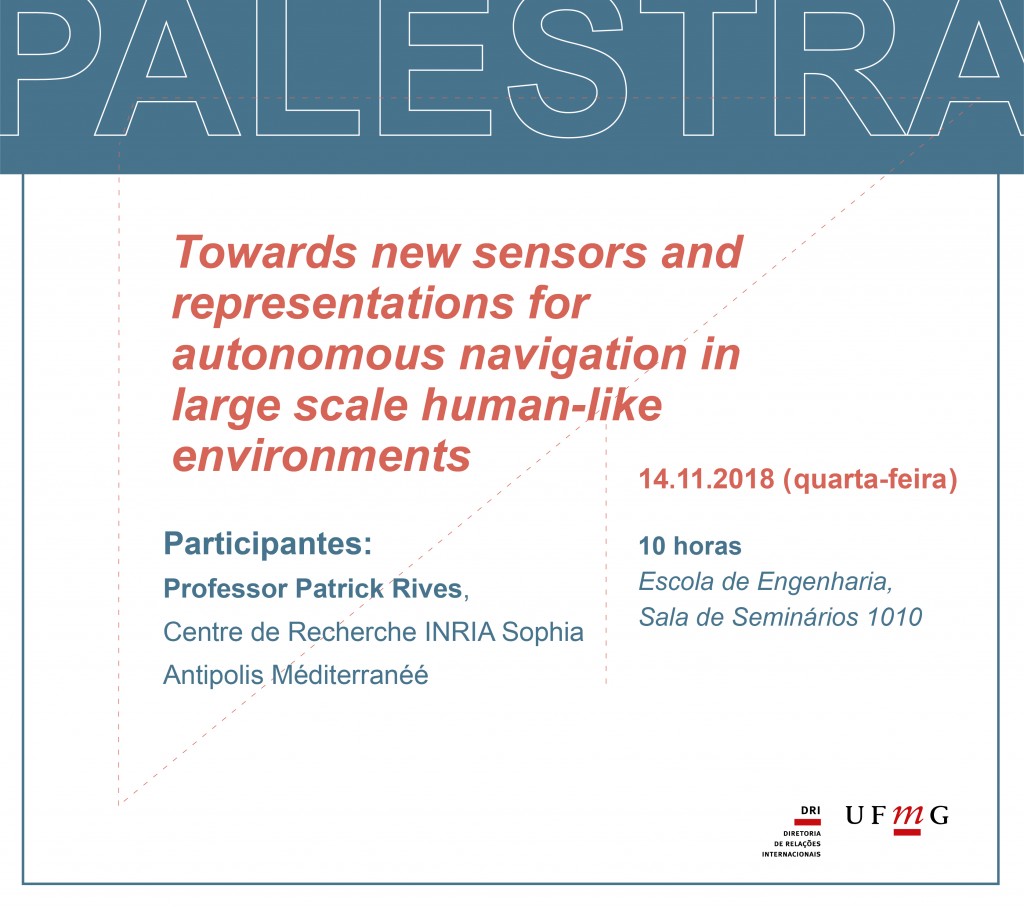Acontecerá no dia 14 de novembro de 2018, na Escola de Engenharia, a palestra Towards new sensors and representations for autonomous navigation in large scale human-like environments, a ser realizada pelo Professor Patrick Rives, do Centre Recherche INRIA Sophia Antipolis Méditerranée. O professor está na UFMG desde o início de novembro e desenvolverá atividades de ensino e pesquisa na área de robótica e inteligência artificial no Departamento de Engenharia Elétrica até dezembro.
Essa iniciativa é desenvolvida no âmbito do Programa Cátedras Franco-Brasileiras na UFMG 2018, financiado pela Diretoria de Relações Internacionais e pela Embaixada da França no Brasil, a fim de incentivar a pesquisa e fomentar a colaboração entre a UFMG e as universidades francesas.
Confira abaixo o resumo dessa apresentação e o currículo do Professor Patrick Rives:
A recente implantação de aplicativos como veículos inteligentes ou robótica social, nos leva a investigar novos paradigmas em termos de percepção, navegação e controle. Esses novos aplicativos compartilham problemas específicos comuns, como segurança, robustez e recursos para interagir com ambientes de grande escala que variam com o tempo. Eles também têm que satisfazer regras sociais quando robôs e humanos compartilham um espaço comum. Nesta palestra, nos concentramos nos aspectos de percepção e navegação autônoma e apresentamos alguns resultados recentes obtidos pela equipe do INRIA LAGADIC em Sophia Antipolis.
Patrick Rives received his Ph.D. degree in Robotics and Automation from the University of Montpellier, France, in 1981. He is now senior researcher at INRIA Sophia Antipolis Méditerranée, and leads the Sophia Antipolis part of the INRIA team LAGADIC bilocalized between Rennes and Sophia Antipolis. His main research interests concern perception techniques applied to autonomous robotics with a peculiar emphasis on sensor-based control techniques. He addressed also the problems of autonomous navigation and SLAM for aerial, underwater and urban vehicles.
Takes place at the School of Engineering of UFMG, on November 14th, the lecture Towards new sensors and representations for autonomous navigation in large scale human-like environments, held by Professor Patrick Rives, from the Center Recherche INRIA Sophia Antipolis Méditerranée. Professor Rives has been at UFMG since the beginning of November and will develop teaching and research activities in the area of robotics and artificial intelligence at the Department of Electrical Engineering until December.
This initiative is being developed under the Franco-Brazilian Chairs Program at UFMG 2018, funded by the Office of International Affairs and the French Embassy in Brazil, in order to promote research and foster collaboration between UFMG and French universities.
Check below the summary of the presentation and Professor Rives’ bio:
The recent deployment of applications like intelligent vehicles or social robotics, lead us to investigate new paradigms in term of perception, navigation and control. These new applications share common specific issues like safety, robustness and capabilities to interact with time-varying large-scale environments. They also have to satisfy social rules when robots and humans share a common living space. In this talk, we focus on the perception and autonomous navigation aspects and we present some recent results obtained by the INRIA team LAGADIC in Sophia Antipolis.
Patrick Rives received his Ph.D. degree in Robotics and Automation from the University of Montpellier, France, in 1981. He is now senior researcher at INRIA Sophia Antipolis Méditerranée, and leads the Sophia Antipolis part of the INRIA team LAGADIC bilocalized between Rennes and Sophia Antipolis. His main research interests concern perception techniques applied to autonomous robotics with a peculiar emphasis on sensor-based control techniques. He addressed also the problems of autonomous navigation and SLAM for aerial, underwater and urban vehicles.
